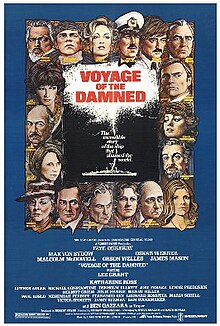Voyage of the Damned
| Voyage of the Damned | |
|---|---|

Film poster by Richard Amsel
|
|
| Directed by | Stuart Rosenberg |
| Produced by |
Robert Fryer William Hill |
| Written by |
David Butler Steve Shagan |
| Based on |
Voyage of the Damned by Gordon Thomas and Max Morgan-Witts |
| Starring |
Faye Dunaway Oskar Werner Lee Grant Max von Sydow James Mason Malcolm McDowell |
| Music by | Lalo Schifrin |
| Cinematography | Billy Williams |
|
Production
company |
|
| Distributed by | AVCO Embassy Pictures |
|
Release date
|
|
|
Running time
|
155 minutes |
| Country | United Kingdom |
| Language | English |
| Voyage of the Damned | ||||
|---|---|---|---|---|
 |
||||
| Soundtrack album by Lalo Schifrin | ||||
| Released | 1977 | |||
| Recorded | 12 and 13 April 1977 Wembley, England |
|||
| Genre | Film score | |||
| Label | Entr'Acte ERS 6508-ST |
|||
| Producer | John Lasher | |||
| Lalo Schifrin chronology | ||||
|
||||
Voyage of the Damned is a 1976 drama film, which was based on a 1974 book written by Gordon Thomas and Max Morgan-Witts with the same title.
The story was inspired by true events concerning the fate of the MS St. Louis ocean liner carrying Jewish refugees from Germany to Cuba in 1939.
Based on actual events, this film tells the story of the 1939 voyage of the MS St. Louis, which departed from Hamburg carrying 937 Jews from Germany, ostensibly to Havana, Cuba. The passengers, having seen and suffered rising anti-Semitism in Germany, realised this might be their only chance to escape. The film details the emotional journey of the passengers who gradually become aware that their passage was planned as an exercise in propaganda, and that it had never been intended that they disembark in Cuba. Rather, they were to be set up as Pariahs, to set an example before the world. As a Nazi official states in the film, when the whole world has refused to accept them as refugees, no country can blame Germany for the fate of the Jews.
The Cuban Government refuses entry to the passengers, and as the liner waits off the Florida coast, they learn that the United States also has rejected them, leaving the ship no choice but to return to Europe. The captain tells a confidante that he has received a letter signed by 200 passengers saying they will join hands and jump into the sea rather than return to Germany. He states his intention to run the liner aground on a reef off the southern coast of England.
Shortly before the film's end, it is revealed that the governments of Belgium, France, the Netherlands, and the United Kingdom have each agreed to accept a share of the passengers as refugees. As they cheer and clap at the news, footnotes disclose the fates of some of the main characters, suggesting that more than 600 of the 937 passengers who did not make it to the UK ultimately lost their lives in Nazi concentration camps.
...
Wikipedia
